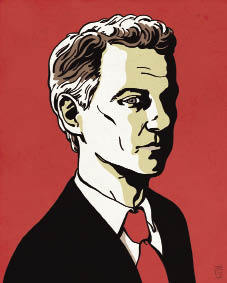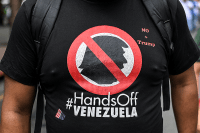The last time Republicans retook control of Congress, in 1994, the face of the revolution belonged to the party’s leader in the House of Representatives, Newt Gingrich. This year the standard-bearer is a less obvious figure: Rand Paul, the newly elected junior senator from Kentucky. Not only is Rand not part of the leadership, he is the son of Ron Paul, a maverick former presidential candidate who is considered a pariah within his own party. But this is an outsider’s hour in American politics, and the younger Paul is everywhere hailed as the paragon of the Tea Party revolt.
That revolt has been directed as much against the Republican establishment as against Barack Obama and the Democrats. Grassroots conservatives first drew blood from the Republican centre and left, defeating many of the leadership’s candidates. That was the case in Kentucky, where the Republican Senate leader, Mitch McConnell (who is also the state’s senior senator), backed a moderate, Trey Grayson, against Paul in the party’s primary.
Political logic dictated the choice: Grayson was an experienced politician, Kentucky’s secretary of state. Paul was a neophyte. Who would be more likely to win in November’s general election? Heading into the Republican contest, Grayson had McConnell’s clout and the national party’s fundraising connections at his disposal. Paul had Tea Party activists and his father’s legion of small donors. That was more than enough: Paul crushed Grayson by almost two to one.
The next day, triumph almost turned to disaster when Rachel Maddow, a left-wing commentator, attempted on live television to push Rand into saying that he did not support the 1964 Civil Rights Act, a position that would have put him firmly outside the pale of acceptable opinion. The view Paul gave echoed his father’s libertarian philosophy: he insisted that he ‘abhorred’ racism, and supported the banning of racial discrimination in government, but added that his strict interpretation of property rights meant that it was not for the government to say that private businesses could not racially segregate their properties. Instead of destroying Paul’s candidacy, however, attacks from the journalistic left only endeared him further to his Tea Party supporters. And the flap was an occasion for the Republican establishment to mend relations: McConnell would of course take any Republican, even Paul, over a Democrat, and Paul now needed whatever cover the party’s leaders and media spokesmen could provide. McConnell and figures such as the Weekly Standard editor William Kristol, whose neoconservatism put him at odds with Paul’s libertarianism, took to the airwaves to defend him.
Paul reciprocated by trimming his philosophical sails and adopting positions that made him more attractive to the Republican mainstream. Even as his father dismissed Republican angst over the so-called Ground Zero Mosque, he sided with those who considered it an affront to victims of 9/11. Some of Ron Paul’s libertarian supporters had already been alarmed by his son’s support for military rather than civilian trials for terrorist suspects held at Guantanamo Bay and by his bellicose rhetoric toward Iran. They were appalled when Esquire reported that Rand had met the hawkish Kristol in Washington.
This had no appreciable impact on Paul’s popularity with the Tea Partiers. For better or worse — and certainly to greater political effect — he was not attempting to re-run his father’s 2008 presidential campaign. The Tea Party movement of 2010 has a genealogical connection to Ron Paul’s campaign — inspiration for the name may have come from one of his online fundraising efforts, held in 2007 on the anniversary of the Boston Tea Party — but it represents a different, less comprehensive philosophy. In contrast to the non-interventionist Ron Paul, the Tea Partiers have no coherent foreign policy, while the typical Republican voter, in 2010 as in 2008, likes candidates who talk tough on defence. That rhetoric can be misleading, however: even as Rand Paul and other Tea Party Republicans brandish sabres at Iran, they have been steadily critical of the wars in Afghanistan and Iraq.
Other Tea Party candidates who won on Tuesday could have succeeded in 1994 or any other good Republican year — and would have lost in 2006, 2008, or any other bad year for their party. Paul is unusual in being propelled by something other than the tide. He has made a self-conscious attempt to fuse the philosophy of the average Republican voter — small government at home, strong defence — with a libertarianism that is new on the political scene. He’s the Republican senator most likely to urge the decriminalisation of marijuana, and he may object to the next extension of the Patriot Act or surge of troops in Afghanistan. But he is not his father; he is developing his own synthesis of the possible and the prudent.
Paul owed his primary victory to the outsiders, but he needed Kentucky Republicans to unite behind him. Jack Conway, his Democratic opponent, was a credible threat — he was the state’s attorney general, adept at grassroots fundraising, and willing to stoop to innuendo; some of his advertisements used the story of a college prank to question Paul’s Christianity. Again, however, the attack backfired. By the time of the election, Paul had grassroots activists, Republican regulars and independent voters behind him.
Now Paul and the Tea Partiers who have taken him for their champion face a new test, one that Newt Gingrich and the Bush administration failed: can they govern as conservatives? Paul has so far shown that despite his gaffes he has a knack for translating what might otherwise be the politics of protest — Tea Party anger and his father’s libertarianism — into electoral success. That may or may not be the same talent required to transmute those elements into sound policy. But Paul comes to Washington as the one outsider the insiders have to take seriously.
Daniel McCarthy is editor of the American Conservative.






Comments